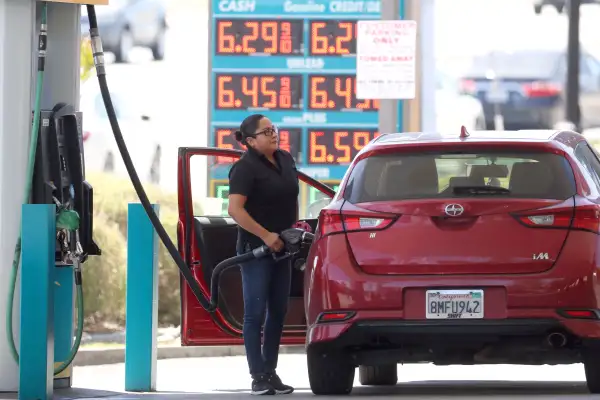$5? $7? Here's Where Experts Say Gas Prices Are Heading This Summer

Summer is right around the corner, and experts are warning that record-high gas prices could climb even higher as vacation season kicks off.
Right now, the average price of a gallon of gas is a record $4.60, according to AAA — 50 cents higher than a month ago and $1.50 more than a year ago. Where will gas prices go from here? It's impossible to say for sure, but most forecasts say fuel costs won't be cheap anytime soon.
In a research note last week, analysts from JPMorgan predicted that if strong consumer demand for gas persists amid the lowest supply of gasoline in three years, average prices could surge to $6.20 per gallon by the end of the summer. That would amount to a 35% bump over prices at the pump today.
It’s not unimaginable. Some counties in California are already grappling with prices higher than $6 per gallon, and $7 gas isn't that far away. But not everyone agrees with that dramatic forecast.
“This is *not* a guarantee,” Patrick De Haan, head of petroleum analysis at the gas price-tracking app GasBuddy, tweeted in response to JPMorgan’s prediction. “$5 is a strong possibility. But $6? Not impossible. But improbable. For now.”
The predictions for summer gas prices from the U.S. Energy Information Administration (EIA) are quite different from the numbers circulated by JPMorgan. Earlier this month, the EIA forecast that retail gasoline prices would average $3.84 per gallon between April and September.
This forecast originates from an energy outlook published in April, and it's based on the assumption that prices will drop significantly over the course of the summer. Even if prices decrease in the months ahead as the EIA is forecasting, Americans would still end up paying a lot more than usual for gas.
If the average gas price was $3.84 per gallon, it would be the highest summer prices since 2014 after adjusting for inflation. And at that price, the average household could expect to spend about $2,945 on gas this year — $455 more than last year, according to the EIA.
Meanwhile, GasBuddy's experts are predicting that summer gas prices will be somewhere in between the forecasts of JPMorgan and the EIA. In a recent blog post, GasBuddy said it expected the national average for regular gas to be $4.65 over Memorial Day — which would be the highest level ever for that weekend — and for prices to average $4.40 between Memorial Day and Labor Day.
Roughly 60% of the retail price of gasoline is determined by the price of crude oil, according to the EIA. Right now, the crude oil market is incredibly volatile amid the ongoing conflict between Ukraine and Russia, which is one of the world’s largest oil producers.
The conflict abroad is constricting supply at a time when demand is rising as pandemic restrictions wane, and the result is rising prices. Right now, crude oil is hovering around $115 per barrel. In February, oil strategist Dan Dicker of Energy Word told Yahoo! Finance that $150 per barrel oil isn’t out of the question in the foreseeable future. At those levels, Dicker said, gas prices could hit $7 per gallon or more.
Of course, there’s never a guarantee when it comes to the oil market. A Monday report from AAA suggested that crude prices were likely to decline as the threat of a recession increases.
Consumer demand also plays a role in gas prices. Despite high inflation, it's widely expected that more Americans will be traveling this summer compared to 2021.
Another factor? The weather. In a blog post earlier this month, GasBuddy's De Haan said that oil refinery operations could be impacted by hurricane season, which typically starts in June. Reduced refinery activity means lower supply, and that means higher prices.
Regardless of whether prices hit $5, $6 or $7, or if they somehow drop a little lower, U.S. drivers should prepare to spend more than usual on gas — at least for the summer. “Consumers should not expect much in the way of relief in prices at the pump until the end of the year,” JPMorgan’s analysts wrote last week.
More from Money:
How to Save Money During a Summer When Everything Is Super Expensive
